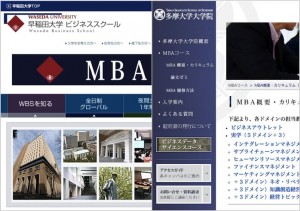◆定量3科目をすべて英語で学ぶセミナー
おそらく日本初でしょう。
2015年5月~7月にかけて、
- 財務会計(Financial Accounting)
- 管理会計(Managerial Accounting)
- コーポレート・ファイナンス(Corporate Finance)
の、ビジネススクール定量分野3科目を、すべて英語で学ぶための半日セミナー(半日×3回)を開催します。
英語と会計・ファイナンスは、グローバルビジネスの共通言語です。
どちらも完ぺきである必要はないですが、グローバル市場でビジネスを遂行していくために、必要最低限は話せなくてはならないグローバル言語です。
そうであるなら、会計・ファイナンスと英語を同時に学んでみてはどうでしょう。
多くの会計・ファイナンス用語は英語の方が直接的で分かりやすい表現なので、学んでいくうちに実は一石二鳥であることに気づくはずです。
◆英語しか話せなくてもOK、会計しか話せなくてもOK
"I can only speak English, and how could I master the essence of accounting/finance in Japan?"
「経理担当なので会計知識は一通り分かっているつもりですが、非日本人と英語で丁々発止とやり合うことができるのでしょうか?」
どちらも心配ないでしょう。グローバルで話されるビジネス言語は、必ずしもネイティブな英語ではないし、完璧な会計・ファイナンスでもありません。
エッセンスを押さえ、ビジネスを推し進めるために必要なコミュニケーションとしての英語であり、会計・ファイナンス言語なのです。
半日ですべてを学ぶことはできないですが、ビジネスの定量的側面を英語で使いこなしていくためのエッセンスは、ケースや演習を通して、コンパクトにしっかりと学んでいただける内容です。
この機会にまずは各科目の全体像とエッセンスをつかみ、次のステップで海外ビジネススクールで学んだ入り、海外赴任で実践に入るという方にも、有益な機会となるでしょう。
◆具体的なプログラム内容
英語で学ぶ会計・ファイナンス
~ Accounting & Finance in English ~
主催者: みずほ総合研究所(内幸町)
開催日は、
- 2015年5月18日(月) 財務会計(Financial Accounting)
- 2015年6月15日(月) 管理会計(Managerial Accounting)
- 2015年7月13日(月) コーポレート・ファイナンス(Corporate Finance)
時間は3回ともに、13:30~18:00です。
午前中に集中して仕事を終わらせていただき、昼食を召し上がった後に午後時間をたっぷりと使って学べる構成としました。
3科目すべて同時受講(これが絶対おすすめです!)、または個別科目でのご受講も可能となっています。
少し長くなりますが、せっかくですので3科目のコース内容をすべて英語でご紹介しましょう。(日本語によるコース内容はリンク先よりご覧ください)
これこそグローバル人財を目指す自分自身が、あるいはあの部下が、あの社員が受講すべきプログラムだとお考えになる方々。
どうぞ受講を前向きにご検討ください!
◎ 2015年5月18日(月)
第1講 財務会計 ~Financial Accounting~
企業活動や経営戦略を英語決算書から読み取り、成功するビジネスへと結びつける力を、英語半日コースで学びます。
1.Introduction to Financial Accounting
(1)Role of Financial Accounting
(2)How financial statements are utilized across stakeholders
(3)Three Key Questions towards accounting rules, account titles and accounting numbers (Why? ⇒ So What? ⇒ How?)
2.Income Statement (Profit and Loss Statement)
(1)Flow information that videotapes corporate activities
(2)Reading I/S with a matrix
(3)Quiz: Comparing five companies and guessing which one is which
(4)Overview of industry averages in profitability ratios
(5)Case study of Company A
3.Balance Sheet
(1)Stock information that snapshots corporate activities
(2)Three rules in reading B/S; Big Picture, Prioritization, and Hypothesis Thinking
(3)Focus in analyzing accounts receivable, inventories, PP&E and accounts payable
(4)CF management with working capital investment
(5)Evaluation of capital structures
(6)Overview of industry averages in asset efficiency ratios
(7)Case study of Company B
4.Business Segment Analysis
(1)Analyzing Company C's business segment
(2)Calculating composition ratios, ROA, ROS, ATO, and investment ratios
(3)Finding differences across multiple business segments
5.Comprehensive Case Study
(1)Analyzing Company D's financial statements with 6 steps
6.Wrap-up and Q&A
◎ 2015年6月15日(月)
第2講 管理会計 Managerial Accounting
事業を評価し、正しい意思決定へと導く管理会計を、英語でつかいこなしていくため、英語半日コースで学びます。
1.Introduction to Managerial Accounting
(1)Role of Managerial Accounting
(2)Managerial Accounting vs Financial Accounting; Clarifying differences with 7 keywords
(3)Three approaches in classifying costs; Variable vs Fixed, Direct vs Indirect, Differential vs Sunk
2.Break-Even Point Analysis
Quiz; Opening a restaurant. Sales price, Sales mix, Number of customers, Variable costs, Fixed costs, and Marginal profit are projected.
(1)Calculating Break-even point (BEP) sales, BEP ratio, Degree of operating leverage to understand structures of the business
(2)Simulating the impact to profit when shift in sales mix takes place
(3)Simulating conversion between variable costs and fixed costs to find appropriate cost structures under a certain corporate environment
(4)Simulating the impact to profit when there is a change in Marketing 4Ps
3.Evaluating profit by business division, by product or by customer
(1)Classifying direct costs and indirect costs
(2)Calculating profit by product and deciding product portfolio
(3)Traditional Cost Accounting and Activity Based Costing (ABC)
4.Budget and Control
(1)Defining strategy is always the first thing when budgeting takes place
(2)Quantifying strategy utilizing 3Cs and marketing 4Ps
(3)Budgeting with both financial accounting and managerial accounting skills
(4)Difference analysis in actual versus budget comparison
5.Wrap-up and Q&A
◎ 2015年7月13日(月)
第3講 コーポレート・ファイナンス Corporate Finance
事業価値を算定し、企業価値の向上へと発展させるコーポレート・ファイナンスを、英語でつかいこなしていくため、英語半日コースで学びます。
1.Introduction to Corporate Finance
(1)Role of Corporate Finance
(2)Corporate Finance vs Accounting; Clarifying differences with 3 keywords
(3)Expressing business investing as FCF (Free Cash Flow) and cash financing as WACC (Weighted Average Cost of Capital)
(4)Listening to division managers who utilize corporate finance at work(Sales, R&D, Manufacturing, Accounting, Personnel, M&A)
2. Investment Decision Making with NPV and IRR
(1)Time value of money requires Discounting future cash flows
(2)Two powerful DCF formula that assumes eternity
(3)Decision making with NPV and IRR; Understanding merits and demerits of each method and utilize them in actual business
3.WACC is the ultimate rate that corporate must achieve
(1)Rate of return required form investors is a hurdle rate
(2)Rate of return required from debt holders and tax shield
(3)Rate of return required from equity holders and CAPM formula
4.Variety of approaches in valuation
(1)Cost Approach; Merit is objectivity and demerit is seller's perspective
(2)Market Approach; Merit is demand/supply reflection and demerit is lack of individuality
(3)Income Approach; Merit is buyer's perspective and demerit is subjectivity
5.Comprehensive Case Study
Running feasibility study of buying Company X. Given X's next year income statement, balance sheet as well as 5 year management plan, calculate fair value of X's stock price to offer
(1)Cost Approach
(2)Market Approach
(3)Income Approach
6.Wrap-up and Q&A
英語で学ぶ会計・ファイナンス
~ Accounting & Finance in English ~
主催者: みずほ総合研究所(内幸町)


